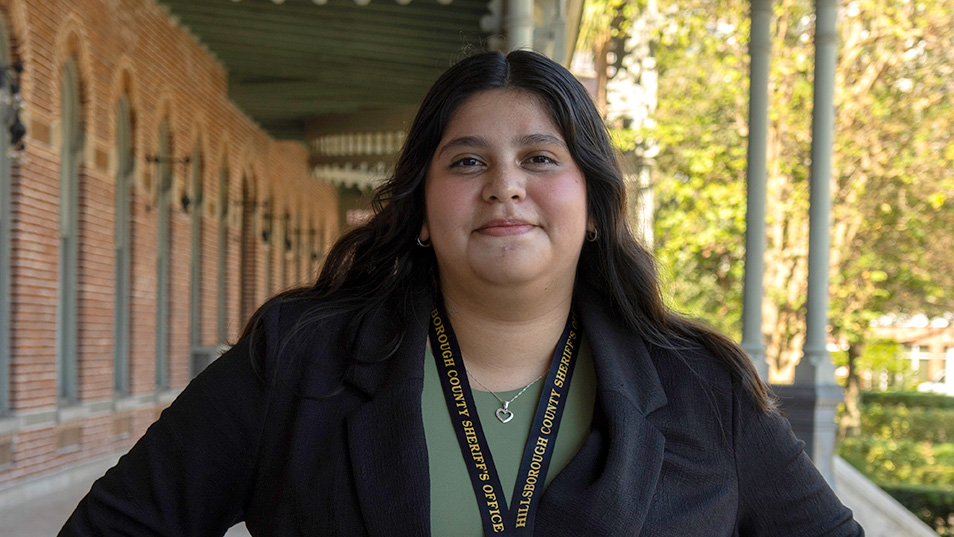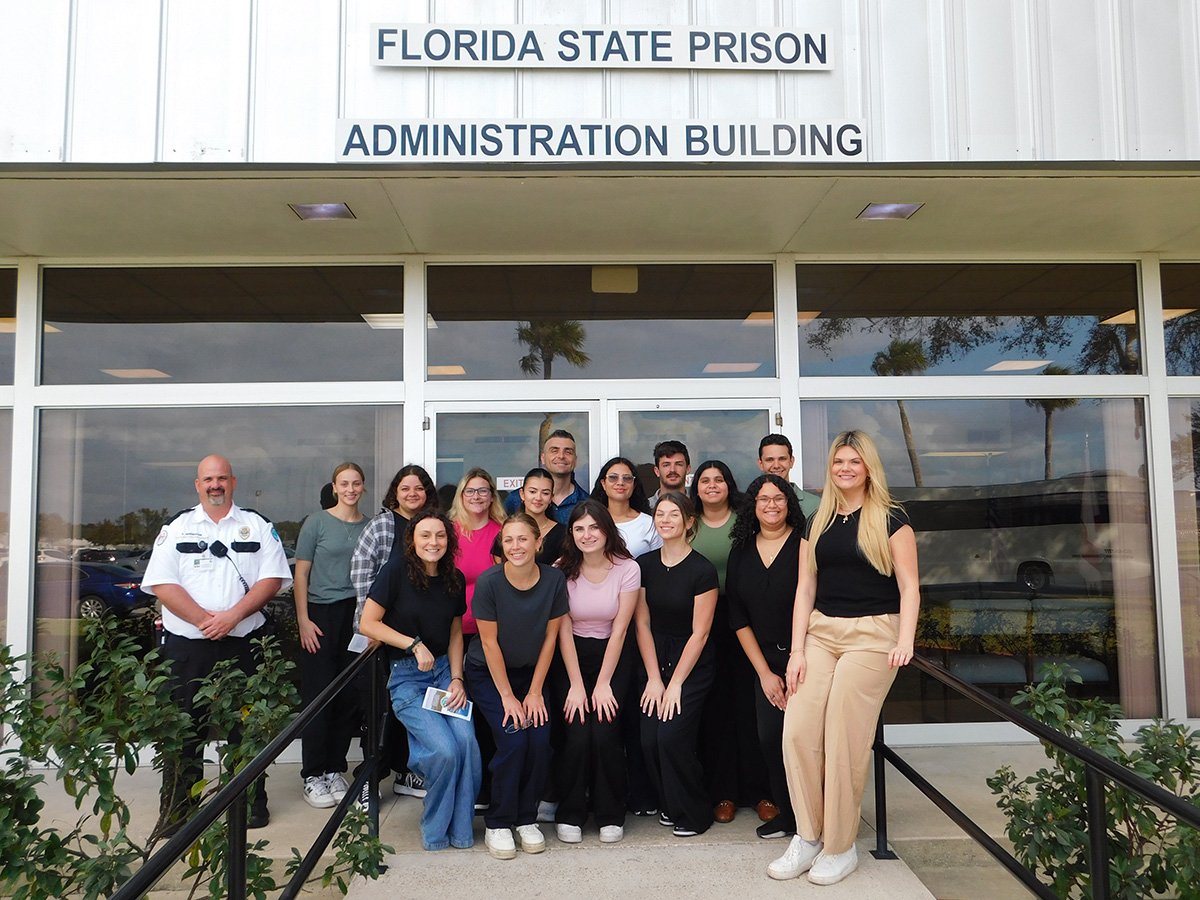The Bachelor of Science in Criminology and Criminal Justice program prepares students for graduate school or to work in a position related to criminology and criminal justice. Students receive exposure to the most recent thinking and research in each substantive area and can take a wide array of courses focusing on criminological theories, victimology, policing, corrections, the court system, white collar crime, comparative criminal justice and more. Faculty in the department have a variety of backgrounds, exposing students to all facets of the criminal justice system.
- Internships
- Career Opportunities
- Experiential Learning
- Student Organizations
- Travel Courses

After serving as a victim advocate in the Hillsborough County State Attorney's Office, Emily Ramos ’25 now has the opportunity to see how victim advocates operate within law enforcement.
Criminology and criminal justice majors can obtain invaluable hands-on experience through internships in a variety of key areas, including the courts, corrections, juvenile justice, policing, victim services and the legal system. Through our extensive partnerships with agencies at all levels of government, students can gain exposure to real-world challenges and build a professional network across multiple sectors. These internships are an essential step in preparing for a successful career in criminology and criminal justice, providing students with the practical skills and knowledge needed to make an impact in the field.
Criminology and criminal justice internships provide an exceptional opportunity for students to take what they have learned in the classroom and apply this knowledge in the criminal justice field.
Some of the many organizations our students have interned with include:
- U.S. and State Attorney’s Offices
- Public Defender’s Office
- U.S. Pretrial Services
- Children's Advocacy Center
- Children's Justice Center
- Juvenile Assessment Center
- ACTS Youth Residential
- Department of Juvenile Justice
- Guardian ad Litem Program
- Drug Enforcement Administration
- Hillsborough County Sheriff’s Office
- Tampa Police Department
- Florida Department of Corrections
Students interested in completing an internship should contact Gabe Paez.
Criminology and criminal justice graduates have been accepted to the best graduate and law schools in the country. Other students who choose to enter the workforce have found employment in a variety of criminal justice agencies, such as United States Customs Service, Hillsborough County Sheriff's Office, Tampa Police Department, Bay Area Youth Services and numerous criminal justice agencies throughout the nation.
Career Opportunities by Type
| Victim Services | Victim advocate with local, state, or federal law enforcement Victim-witness units Victim specialistDomestic violence nonprofit organization |
| Juvenile Justice | Juvenile probation officer Juvenile court counselor Juvenile detention officer Child protection investigator |
| Research and Analysis | Criminologist Crime analyst Research analyst |
| Corrections | State or federal corrections officer Detention deputy Probation officer |
| Law Enforcement | Federal law enforcement (e.g., FBI, Secret Service, ATF, DEA, U.S. Marshals) State law enforcement Local/municipal law enforcement Wildlife or fish and game officers |
| The Courts and Law | Paralegal Court clerk Investigators |
UTampa Success Stories:
Graduates of the UTampa criminology and criminal justice department have held the following positions:
- Mayor, Tampa
- Police chief, Tampa
- Attorney, Winston and Strawn, Chicago
- Senior psychologist, Florida State Prison
- Senior fraud recovery officer, Tampa Bay Federal Credit Union
- Bilingual securities international processing representative, Citigroup
- Intelligence analyst, FBI
- Fraud analyst, U.S. Postal Inspection Service
- Senior probation counselor, Salvation Army Correctional Services

Students in Cedric Michel's CRM 427: Death Penalty class took a trip to the Florida State Prison where they were able to speak to corrections officers and learn more about the death penalty and execution process in Florida.
The major offers small classes and ample opportunities for experiential learning, which is a key element of the criminology and criminal justice major at UTampa, offering students valuable, hands-on opportunities to connect classroom theory with real-world practice. With access to a wide range of guest speakers from across the criminal justice system—such as law enforcement, the courts, corrections and the legal field—students gain first-hand insights into the workings of the field.
Additionally, students have the opportunity to participate in exclusive tours of important criminal justice facilities, including the state and federal court houses and the Florida State Prison. UTampa’s prime location in downtown Tampa provides students with unique access to numerous agencies, allowing them to build professional networks and gain exposure to a variety of criminal justice sectors. These experiences are integral to preparing students for successful careers in criminology and criminal justice.
There are two main student organizations affiliated with the criminology and criminal justice department: the Criminology Club and Alpha Phi Sigma.
Criminology Club
The Criminology Club welcomes both CRM majors and non-majors. The club meets every Wednesday evening during the academic year, and meetings include a variety of activities, such as guest speakers, agency visits and tours, social events, and service projects. Guest speakers who are working criminal justice practitioners in the Tampa Bay area provide presentations on their experiences in the field. Field trips to local criminal justice agencies allow students to see first-hand the operation of the agencies of criminal justice. Students interested in joining the Criminology Club should contact the club's adviser, Jordan Land.
Alpha Phi Sigma
The Alpha Phi Sigma National Criminal Justice Honor Society is open to criminology and criminal justice majors or minors who have excelled in the classroom. Alpha Phi Sigma recognizes the academic excellence of undergraduate and graduate criminal justice students and is the only criminal justice honor society that is a certified member of the Association of College Honor Societies and affiliated with the Academy of Criminal Justice Sciences.
To be eligible for Alpha Phi Sigma membership, students must have completed at least 37.5% of the credits required for a baccalaureate degree (45 credit hours if 120 credits are needed for graduation), rank no lower than the highest 35% of their class, and have a minimum cumulative GPA of 3.2. If class rank is unavailable, students must have a minimum cumulative GPA of 3.3. In addition, students must have completed a minimum of four courses in the Criminal Justice field with a minimum GPA of 3.2.
Students interested in applying for the Alpha Phi Sigma National Criminal Justice Honor Society should contact the association's adviser, Cedric Michel.

The department also offers exciting travel courses that allow criminology and criminal justice students to explore the field in an international context. These unique courses provide students with the opportunity to study criminal justice systems, policies and practices in other countries, broadening their understanding of global criminology.
Past travel courses have taken students to destinations such as the Netherlands, the United Kingdom, Italy, Greece, Spain, Poland and Argentina, where they have learned about different approaches to law enforcement, legal systems, corrections and more. These immersive experiences not only enhance academic learning but also offer valuable cultural insights and global perspectives, preparing students to engage with the diverse challenges facing criminal justice systems worldwide.
Sample Criminology and Criminal Justice Courses
What You Might Study
CRM 101
Introduction to Criminology
A study of deviant behavior as it relates to the definition of crime, crime statistics, theories of crime causation, crime typologies and victims of crime.
CRM 206
Criminal Investigation
A study of the fundamentals of investigation including crime scene search, collection and preservation of physical evidence, interview and interrogation techniques, use of scientific aids and modus operandi.
CRM 321
Comparative Criminology
A comparison of diverse types of criminal justice systems utilized by other countries and cultures with the United States criminal justice system.
CRM 445
Crime Science
This course explores the application of scientific principles and interdisciplinary methods to the study of crime and crime prevention. Students will examine the integration of criminology, forensic science, geography, psychology, and other disciplines to develop evidence-based strategies for addressing crime.

